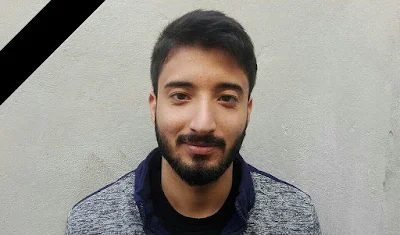Amnesty International is outraged by reports that the Iranian authorities have executed a young man convicted of murder who was only 15 years old at the time of the crime.
The organization learned that 22-year-old Ali Kazemi was hung earlier today in prison in Busher province. His execution was scheduled and carried out without any notice given to Ali Kazemi's lawyer as required by Iranian law.
"By carrying out this unlawful execution, Iran is effectively declaring that it wishes to maintain the country's shameful status as one of the world's leading executioners of those who were children at the time of their crime," said Magdalena Mughrabi, Amnesty International's Middle East and North Africa Deputy Director.
"This is nothing short of an all-out assault on children's rights, as enshrined in international law, which absolutely bans the use of the death penalty against someone who was under 18 years of age at the time of the crime."
"It is long overdue for the head of Iran's judiciary to intervene and establish an official moratorium on executions of juvenile offenders
Ali Kazemi was convicted of murder in connection with the fatal stabbing of a man during a fight in March 2011. He was only 15 years old at the time the crime was committed.
Amnesty International understands that prison officials and prosecution authorities in Busher tormented Ali Kazemi's family by making contradictory statements as to whether and when the execution would be carried out.
On 29 January, his family was told Ali Kazemi's execution had been scheduled for the next day and that they should go to Busher prison in the evening for a last visit.
By carrying out this unlawful execution, Iran is effectively declaring that it wishes to maintain the country's shameful status as one of the world's leading executioners of those who were children at the time--Magdalena Mughrabi, Amnesty International's Middle East and North Africa Deputy Director.
However, that same evening the family was told Kazemi's execution had been halted. On the morning of 30 January, the authorities called to reassure the family that the execution had not taken place. However, at midday today, Ali Kazemi's family was suddenly told the execution had just been carried out.
Ali Kazemi's execution comes less than a month after Iran executed another man who was under the age of 18 at the time of the crime, Amirhossein Pourjafar, on 4 January.
Between 2005 and 2018, Amnesty International recorded the execution of 87 people convicted by the courts in Iran for crimes that occurred when they were under the age of 18. This includes 4 in 2017 and 2 so far in 2018. Amnesty International has identified at least 80 individuals who are on death row in Iran for crimes that took place when they were under 18 years of age.
Background
The Convention on the Rights of the Child is unequivocal in its absolute prohibition on the use of the death penalty for crimes committed by people below 18 years of age.
It is also well-established in the principles of juvenile justice that individuals under 18 years of age should be treated as less mature and culpable, and should never face the same penalties as adults.
Amnesty International opposes the death penalty in all cases without exception regardless of the nature of the crime, the characteristics of the offender, or the method used by the state to kill the prisoner. Amnesty International has consistently called on all countries that still use the death penalty to establish an official moratorium on executions with a view to abolishing the punishment.
Source: Amnesty International, January 31, 2018
Execution of a Juvenile Offender in Iran
Iran Human Rights (Jan 30, 2018): Ali Kazemi, a juvenile offender who committed a murder at age 15, was hanged on the morning of Tuesday at Bushehr Central Prison.
On Tuesday, January 30, The Imam Ali Society reported the execution of Ali Kazemi on his Twitter account. The juvenile offender, who was only 15 at the time of crime, was sentenced to death on murder charges.
 The report mentions that there were some promises [from authorities] that execution of the juvenile would be halted, but the sentence was carried out ultimately.
The report mentions that there were some promises [from authorities] that execution of the juvenile would be halted, but the sentence was carried out ultimately.
The murder was reportedly committed seven years ago and Ali Kazemi was 22 at the time of the execution.
The execution of juveniles is strictly banned in the international laws, however, Ali Kazemi is the second juvenile offender who has been executed this month. On Thursday January 4, Amir Hossein Pourjafar, who had committed murder at age 16, was executed at Rajai Shahr Prison.
These sentences prove that the Article 91 of the Islamic Penal Code (2013), as well as other articles related to protection of children at risk of retaliation, cannot effectively protect juvenile-offenders from execution.
The execution of this Juvenile offender is a violation of the Convention on the Rights of the Child which Iran has ratified.
Iran Human Rights (IHR) strictly condemns the execution of Ali Kazemi and urges the international community to stop the execution of juveniles in Iran.
This execution has not been announced by the state-run media so far.
Iran Human Rights (IHR) has reported executions of five juvenile offenders in Iran in 2017.
Source: Iran Human Rights, January 31, 2018
⚑ | Report an error, an omission, a typo; suggest a story or a new angle to an existing story; submit a piece, a comment; recommend a resource; contact the webmaster, contact us: deathpenaltynews@gmail.com.
Opposed to Capital Punishment? Help us keep this blog up and running! DONATE!
"One is absolutely sickened, not by the crimes that the wicked have committed,
but by the punishments that the good have inflicted." -- Oscar Wilde
but by the punishments that the good have inflicted." -- Oscar Wilde




Comments
Post a Comment
Pro-DP comments will not be published.